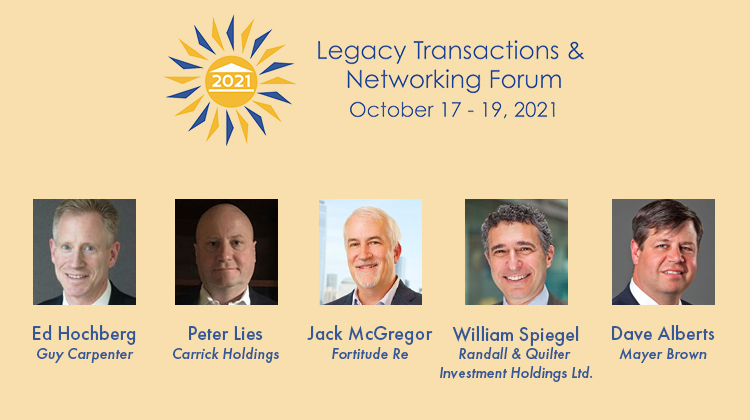A Bright Time for Legacy

The education portion of AIRROC’s Fall 2021 Legacy Transactions & Networking Forum kicked off with a lively panel discussion on the current state of the legacy space, highlighting the large number of successful recent deals, the forces that drive transaction supply and demand, and the challenges that lie ahead. Titled “A Bright Time for Legacy,” the discussion was moderated by Dave Alberts, Partner and Co-Lead Global Insurance Industry Group, Mayer Brown, and featured commentary from panelists Ed Hochberg, Head of Global Risk Solutions, Guy Carpenter; Peter Lies, Group President, Carrick Holdings; Jack McGregor, Head of P&C, Fortitude Re; and William Spiegel, Executive Group Chairman, Randall & Quilter Investment Holdings Ltd.. Perhaps unsurprisingly, the esteemed panel agreed that the current state and future potential of the legacy space is indeed, “bright.” The panel noted that the industry has seen lots new players in the market, bringing with them new ideas, increased creativity, and the capital to make transactions possible. The availability of new capital, however, has not led to irresponsible pricing or activity. As one panelist said, our industry’s market has proven itself fundamentally rational.
Discussing the “demand” side of the industry (focusing on the companies that own legacy business and are seeking a transaction to transfer/reinsure/runoff the liabilities) the panelists found that today’s sellers have diverse motivations, perhaps more so than in the first generation of dealmaking (which focused on segregation of asbestos and environmental liabilities). Today’s deals focus much more on the liberation of “stranded capital,” which can be freed up for reinvestment through a legacy transaction. On the “supply” side, companies with capital to invest are looking for a reasonable return over a specific time window. Both sides recognize that there are few “lay-ups” in this space – every deal is different, and has its own potential benefits and pitfalls. Careful underwriting and risk evaluation is crucial, and the brokers can play an important role in helping to identify books that may be ripe and attractive to both sides for a transaction. The panelists all agreed it was better to prioritize discipline over speed. “A bad deal is bad for the market.”
Finally, the panel discussed the challenges that could cloud their bright forecast. These included social inflation, which can lead to large valuation spreads between buyer and seller on a specific book. Also discussed was the potential for unintended correlation across books owned by a single company – a coordinated downturn in seemingly unrelated portfolios could be challenging for the owner of those risks.
Please follow and like us:







